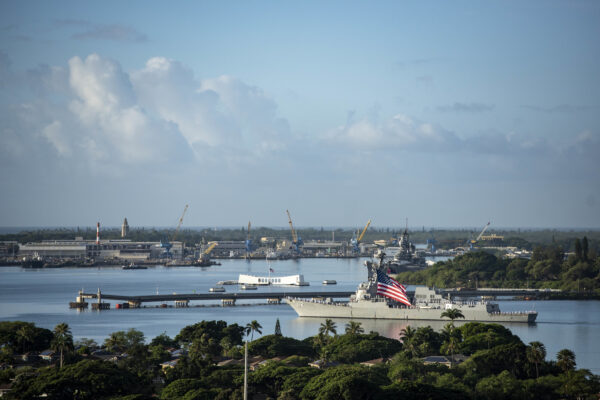
Pearl Harbor Remembrance Day was established in 1994 to honor victims of the surprise Attack on Pearl Harbor in 1941. (Photo: Mass Communication Specialist 2nd Class Charles Oki, U.S. Navy)
December 7 marks Pearl Harbor Remembrance Day, commemorating the events that forced the United States into World War II.
Dec. 7, 1941: The Attack on Pearl Harbor
In the early morning hours of Dec. 7, 1941, Imperial Japan launched a surprise attack on the U.S. Navy base at Pearl Harbor, Hawaii. Hundreds of Japanese aircraft swarmed the base, conducting bombing runs that killed 2,403 Americans and wounded nearly 1,200.
All eight U.S. battleships docked in the harbor were severely damaged or sunk, along with several support ships and nearly 200 aircraft.
The attack was meant to demoralize the American public and cripple the U.S. Navy so that Imperial Japan could act with impunity as it continued its conquest of the Pacific. However, the Axis Power underestimated American industrial capacity and resolve.
Legacy of the Attack on Pearl Harbor
While losses at Pearl Harbor were staggering, the U.S. carrier fleet was left largely intact and all but two of the damaged battleships were returned to duty. The crippling blow Imperial Japan meant to deliver was anything but.
Instead, the United States would be the first to deliver a decisive strike. Roughly seven months after the Attack on Pearl Harbor, the Battle of Midway saw the Japanese Navy suffer a devastating defeat that would ultimately lead to Japan’s surrender in 1945, ending the Pacific War.
Pearl Harbor Remembrance Day
In 1994, Congress declared December 7 as Pearl Harbor Remembrance Day to honor the victims of the attack as well as those who were killed during the course of the Pacific War.
To learn about more U.S. Military and veterans holidays, click here.